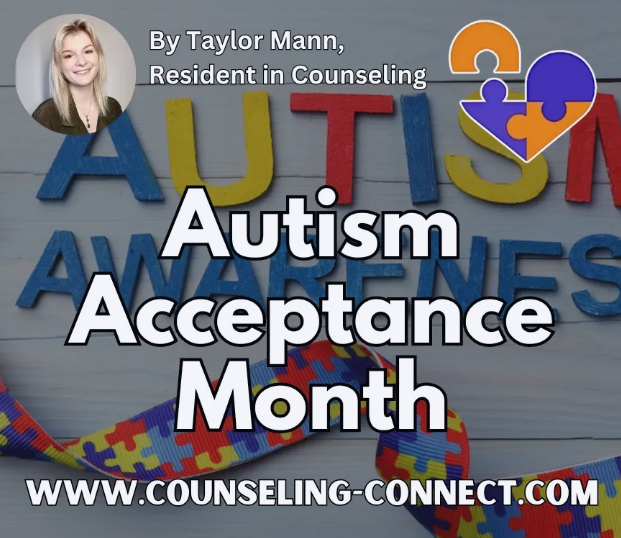By Elle Ryan, Resident in Counseling
April is now Autism Acceptance Month! Previously, it has been referred to as Autism Awareness Month. So what’s the difference between awareness and acceptance?
In an article by the British Broadcasting Corporation, Sarinah O’Donoghue suggests shifting the language of “awareness” (often linked with disease) to a more positive expression of “acceptance” when talking about autism. Since 2011, the Autistic Self-Advocacy Network (ASAN) has identified April as “Autism Acceptance Month” to highlight the importance of accepting autism as a natural part of the human experience. Autism Acceptance fosters meaningful dialogue towards the struggles of those affected by autism, such as bullying, prejudice, limited job opportunities or access to resources such as health care. Other groups followed suit to use Autism Acceptance over Autism Awareness, including organization such as:
● Association of University Centers on Disabilities● Autistic Women and Non-Binary Network● National Association of Councils on Developmental Disabilities (NACDD)
Since March 2021, the Autism Society of America encourages media to use new language in their coverage, emphasizing the importance of meaning that our words convey. In the mental health and addiction recovery field, service providers strive to use person-first language, so that we don’t dehumanize the people that we serve. For example, we don’t refer to people as “addicts” or “depressives.” These labels cut people down and make their identity synonymous with a disorder. Instead, we recognize their humanity by identifying them as “someone living with depression” or a “person in recovery.” Similarly, we don’t define people as “autistic” and instead, describe them as individuals with autism.
Acceptance plays a key role in building strong support systems by continuing to raise awareness and foster understanding, but also to promote inclusivity and celebrate the diversity of the Autism community. As explained by Lyric Holmans (NeuroDivergent Rebel blog), Autism Awareness is the knowledge that people with autism exist. Autistic Acceptance is about accepting those with autism as they are, both strengths and weaknesses. Autistic Pride is when individuals with autism feel secure and confident, allowing themselves to take pride in their authentic neurodivergent selves.
Autism Parenting Magazine suggests ways to improve autism acceptance by
• Educating yourself on Autism• Participating in local events• Advocating for those with autism.
You can also practice being a positive role model through your actions by speaking up about autism and promoting awareness throughout the year.
References:
Autism Acceptance vs Awareness: Is There a Difference?
An autistic person’s take on Autism Awareness Week: ‘Acceptance is more important than awareness’

